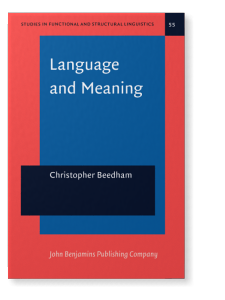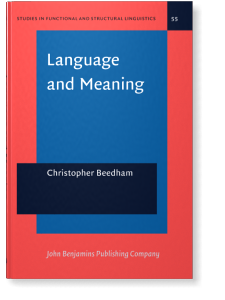Language and Meaning
The structural creation of reality
Published online on 1 July 2008
Table of Contents
-
List of Figures | p. ix
-
List of Tables | p. xi
-
Preface | pp. xiii–xiv
-
Introduction | p. 1
-
1. Saussurean structuralism | pp. 3–17
-
2. Aspect | pp. 19–31
-
3. The passive | pp. 33–60
-
4. Generative grammar | pp. 61–105
-
5. Tense and irregular verbs | pp. 107–133
-
6. Text grammar: Parole versus Langue | pp. 135–152
-
7. The method of lexical exceptions | pp. 153–164
-
Conclusion | pp. 165–169
-
Notes | pp. 171–185
-
-
Appendices | pp. 201–206
-
Glossary of aspect terms | pp. 207–212
-
Name index | pp. 213–215
-
Subject index | pp. 217–225
This book is a real pleasure to read. The chapter on ‘Tense and irregular verbs’ is extremely interesting. The finding of the phonotactic link between strong verbs and function words in the three languages is fascinating and entirely convincing.
”Prof. em. M.A.K. Halliday, University of Sydney, Australia
Ein spannendes Buch mit Kapiteln, die man auch einzeln lesen kann. Ich möchte hier nur neugierig machen, nicht referieren, denn man muss selbst lesen, wie gleichermaßen klar in der Darstellung und Argumentation und rigoros in seiner Kritik zum Beispiel am Distributionalismus und den Generativisten – nicht so sehr an Chomsky selbst – Beedham schreibt.
Also nur ein Hinweis auf Themen, die gerade für einen deutschen Leser ungewöhnliche Perspektiven entwickeln, weil der St. Andrewser Germanist Beedham neben Deutsch und Englisch auch Russisch heranziehen kann, wodurch seine Ausführungen zu Aspekt-Aspekten der deutschen Tempusformen einsichtig werden. Beim Perfekt ahnen wir das ja schon langem, aber hier wird es vorgeführt.
Gleichermaßen sehr lesenwert das methodische Programm des auf Saussure zurückgreifenden Verf., der die Langue, die er präzise von der Parole abgrenzt, als Untersuchungsgegenstand strikt von den Formen her beschreibt und analysiert, denn, so argumentiert er, aus grammatischen und/oder lexikalischen Formen seiner Sprache entwickelt man die Bedeutungen, mit denen man seine Wirklichkeit strukturiert, unterstützt von den anderen Wahrnehmungssinnen.
Zentrale Themen neben der Generativisten-Kritik: Passiv, Tempusformen und was sie – nicht – über die Zeit aussagen, unregelmäßige Verbformen und was an ihnen grammatisch oder was lexikalische Ausnahme ist.
”Cited by (6)
Cited by six other publications
This list is based on CrossRef data as of 18 july 2024. Please note that it may not be complete. Sources presented here have been supplied by the respective publishers. Any errors therein should be reported to them.

